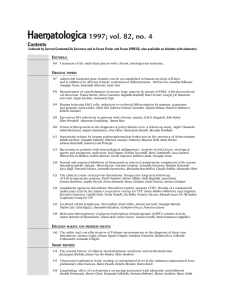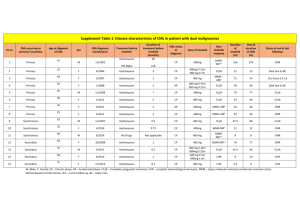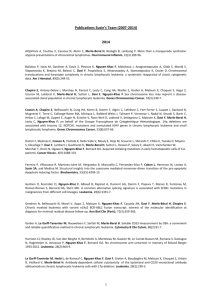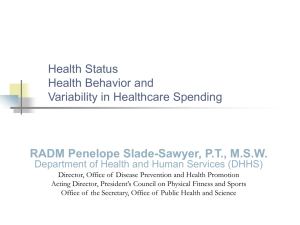ra leukemia
advertisement
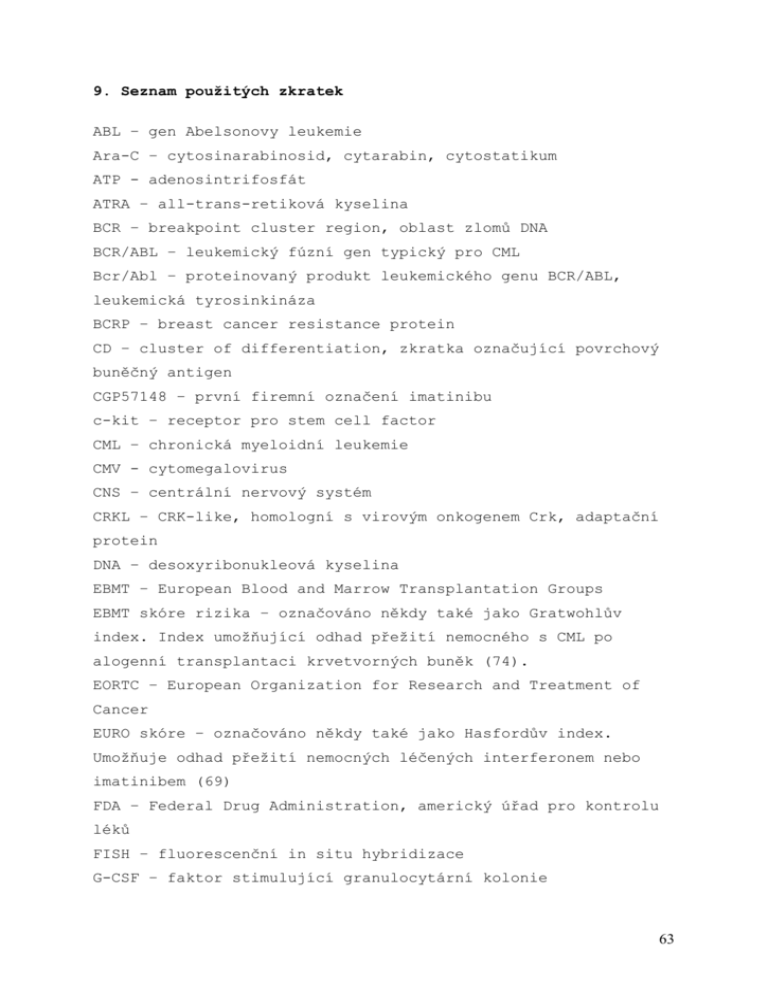
9. Seznam použitých zkratek ABL – gen Abelsonovy leukemie Ara-C – cytosinarabinosid, cytarabin, cytostatikum ATP - adenosintrifosfát ATRA – all-trans-retiková kyselina BCR – breakpoint cluster region, oblast zlomů DNA BCR/ABL – leukemický fúzní gen typický pro CML Bcr/Abl – proteinovaný produkt leukemického genu BCR/ABL, leukemická tyrosinkináza BCRP – breast cancer resistance protein CD – cluster of differentiation, zkratka označující povrchový buněčný antigen CGP57148 – první firemní označení imatinibu c-kit – receptor pro stem cell factor CML – chronická myeloidní leukemie CMV - cytomegalovirus CNS – centrální nervový systém CRKL – CRK-like, homologní s virovým onkogenem Crk, adaptační protein DNA – desoxyribonukleová kyselina EBMT – European Blood and Marrow Transplantation Groups EBMT skóre rizika – označováno někdy také jako Gratwohlův index. Index umožňující odhad přežití nemocného s CML po alogenní transplantaci krvetvorných buněk (74). EORTC – European Organization for Research and Treatment of Cancer EURO skóre – označováno někdy také jako Hasfordův index. Umožňuje odhad přežití nemocných léčených interferonem nebo imatinibem (69) FDA – Federal Drug Administration, americký úřad pro kontrolu léků FISH – fluorescenční in situ hybridizace G-CSF – faktor stimulující granulocytární kolonie 63 GM-CSF - faktor stimulující granulocytární a makrofágové kolonie GVHD – reakce štěpu vůči hostiteli HLA – human leukocyte antigens, hlavní histokompatibilní systém IBMTR – International Bone Marrow Transplant Registry ICE – cytostatická kúra obsahující idarubicin, cytarabin a etoposid IL - interleukin IRIS - International Randomized Study of Interferon and STI571 LDH - laktátdehydrogenáza mini-ICE – redukovaná verze cytostatické kúry obsahující idarubicin, cytarabin a etoposid p210 – leukemická tyrosinkináza vznikající překladem genu MBCR/ABL (analogicky p190 a p230 vzniká překladem z genů m- a μ-BCR/ABL) PDGFR – receptor pro platelet-derived growth factor P-GP – P-glykoprotein Ph – Philadelphia, zkratka používaná pro označení derivovaného chromozomu 22, typického pro CML PKC-δ – proteinová kináza C-δ RIC – reduced intensity conditioning, příprava s redukovanou intenzitou RNA – ribonukleová kyselina RT-PCR – polymerázová řetězcová reakce s reverzní transkriptázou Q-RT-PCR – kvantitativní polymerázová řetězcová reakce s reverzní transkriptázou STI571 – dřívější firemní označení imatinibu TKB – transplantace krvetvorných buněk WHO – World Health Organization 64 10. Literatura 1. Nowell PC, Hungerford DA. A minute chromosome in human chronic granulocytic leukemia. Science 1960;132:14971502. 2. Rowley JD. A new consistent abnormality in chronic myelogenous leukemia identified by quinicrine fluorescence and Giemsa staining. Nature 1973;243:290-3. 3. Heisterkamp N, Stam K, Groffen J, et al. Structural organization of the bcr gene and its role in Ph´translocation. Nature 1985;315:758-761. 4. Lugo TG, Pendergast A-M, Muller AJ, et al. Tyrosine kinase activity and transformation potency of BCR-ABL oncogene products. Science 1990;247:1079-82. 5. Druker BJ, Tamura S, Buchdunger E, et al. Effects of a selective inhibitor of the Abl tyrosine kinase on the growth of Bcr-Abl positive cells. Nat Med 1996;2:561-6. 6. Druker BJ, Talpaz M, Resta DJ, et al. Efficacy and safety of a specific inhibitor of the BCR-ABL tyrosine kinase in chronic myeloid leukemia. N Engl J Med 2001;344:1031-7. 7. Weiden PL, Sullivan KM, Flournoy N, et al. Antileukemic effect of chronic graft-versus-host disease: contribution to improved survival after allogeneic marrow transplantation. N Engl J Med 1981;304:1529-33. 8. Goldman JM, Gale RP, Horowitz MM, et al. Bone marrow transplantation for chronic myelogenous leukemia in chronic phase. Increased risk for relapse associated with T-cell depletion. Ann Intern Med 1988;108:806-14. 9. Kolb H-J, Mittermüller J, Clemm C, et al. Donor leukocyte transfusions for treatment of recurrent chronic myelogenous leukemia in marrow transplant patients. Blood 1990;76:2462-5. 10.Bocchia M, Gentili S, Abruzzese E, et al. Effect of a p210 multipeptide vaccine associated with imatinib or interferon in patients with chronic myeloid leukaemia and persistant residual disease: a multicentre observational trial. Lancet 2005;365:657-62. 11.Deininger MW, Bose S, Gora-Tybor J, et al. Selective induction of leukemia-associated fusion genes by highdose ionizing radiation. Cancer Res 1998;58:421-5. 12.Ichimaru M, Ichimaru T, Belsky JL. Incidence of leukemia in atomic bomb survivors belonging to a fixed cohort in Hiroshima and Nagasaki, 1950 - 1971. J Radiat Res 1978; 19:262. 13.Boice JD Jr, Day NE, Anderson A, et al. Second cancers following radiation treatment for cervical cancer. J Natl Cancer Inst 1987; 74: 955. 14.Cartwright RA, Bernard SM. Epidemiology v Whittaker JA, Delamore IW. Leukaemia. Blackwell Scientific Publications, Oxford 1987; s. 3-23. 65 15.Court Brown WM, Doll R. Adult leukemia. Br Med J 1960;1: 1753. 16.Lichtman MA. Chronic myelogenous leukemia and related disorders v Beutler E, Lichtman MA, Coller BS, Kipps TJ. Williams Hematology, 5. vydání, New York, 1995; s. 298324. 17.Clarkson BD, Strife A, Wisniewski D, et al. New understanding of the pathogenesis of CML: a prototype of early neoplasia. Leukemia 1997;11:1404-28. 18.Rushton L, Romaniuk H. A case-control study to investigate the risk of leukemia associated with exposure to benzene in petroleum marketing and distribution workers in the United Kingdom. Occup Environ Med 1997;54:152-66. 19.Golden R, Pyatt D, Shields PG. Formaldehyde as a potential human leukemogen: an assessment of biological plausibility. Crit Rev Toxicol 2006;36:135-53. 20.Allen PB, Morgan GJ, Wiedemann LM. Philadelphia chromosome-positive leukaemia: the translocated genes and their gene products. Bail Clin Haematol 1992;5:897-930. 21.Goldmann JM. Chronic myeloid leukemia. Current Opinion Hematol 1997;4:277-85. 22.Okamoto K, Karasawa M, Sakai H, et al. A novel acute lymphoid leukaemia type BCR/ABL transcript in chronic myelogenous leukaemia. Br J Haematol 1997;96:611-3. 23.Polák J, Zemanová Z, Michalová K, et al: A new case of chronic myeloid leukemia (CML) in myeloid blast crisis with an atypical (b3a3) junction of the BCR/ABL gene. Leukemia 1998;12:250-1. 24.Rubinstein R, Purves LR. A novel BCR-ABL rearrangement in a Philadelphia chromosome-positive chronic myelogenous leukaemia variant with thrombocythaemia. Leukemia 1998;12:230-2. 25.Guinn B-A, Mills KI. p53 mutations, methylation and genomic instability in the progression of chronic myeloid leukaemia. Leukemia Lymphoma 1997;26:211-26. 26.Aloisi A, Di Gregorio S, Stagno F, et al. BCR-ABL nuclear entrapment kills human CML cells: ex vivo study on 35 patients swith the combination of Imatinib Mesylate and Leptomycin B. Blood 2006;107:1591-8. 27.Nowicki MO, Falinski R, Koptyra M, et al. BCR/ABL oncogenic kinase promotes unfaithful repair of the reactive oxygen species-dependent DNA double-strand breaks. Blood 2004;104:3746-53. 28.Neves H, Ramos C, Gomes da Silva M, et al. The nuclear topography of ABL, BCR, PML and RARa genes: evidence of gene proximity in specific phases of the cell cycle and stages of hematopoietic differentiation. Blood 1999;93:1197-207. 29.Biernaux C, Loos M, Sels A, et al. Detection of major BCR-ABL gene expression at a very low level in blood 66 cells of some healthy individuals. Blood 1995;86:3118-22. 30.Melo JV, Bose S, Gora-Tybor J, et al. Detection of leukemia-associated fusion genes in leukocytes from normal people and hematopoietic lines using an "improved" RT/PCR assay. Blood 1997;90(Suppl 1):501a. 31.Goldman JM, Melo JV. Chronic myeloid leukemia – advances in biology and new approaches to treatment. N Engl J Med 2003;349:1451-64. 32.Posthuma EFM, Falkenburg JHF, Apperley JF, et al. HLA-A3 and HLA B8 may protect against acquiring chronic myeloid leukemia. Blood 1997;90(Suppl 1):250a. 33.Coleman S, Throp D, Fisher J, et al. Cytokine enhacement of immunogenicity in chronic myeloid leukaemia. Leukemia 1997;11:2055-9. 34.Oka T, Sastry KJ, Nehete P, et al. Evidence for specific immune response against p210 BCR-ABL in long-term remission CML patients treated with interferon. Leukemia 1998;12:155-63. 35.Musashi M, Abe S, Yamada T, et al. Spontaneous remission in a patient with chronic myelogenous leukemia. N Engl J Med 1997;336:337-9. 36.Provan AB, Majer RV, Herbert A, et al. Spontaneous remission of chronic myeloid leukaemia with loss of the Philadelphia chromosome. Br J Haematol 1991;78:578. 37.Dowding C, Guo AP, Osterholz J, et al. Interferon-alpha overrides the deficient adhesion of chronic myeloid leukemia primitive progenitor cells to bone marrow stromal cells. Blood 1991;78:499-505. 38.Majlis A, Smith TL, Talpaz M, et al. Significance of cytogenetic clonal evolution in chronic myelogenous leukemia. J Clin Oncol 1996;14:196-203. 39.Fialkow PJ, Martin PJ, Najfeld V, et al. Evidence for a multistep pathogenesis of chronic myelogenous leukemia. Blood 1981;58:158-63. 40.Gordon MY, Goldman JM. Cellular and molecular mechanisms in chronic myeloid leukaemia: Biology and treatment. Br J Haematol 1996;95:10-20. 41.Bruchova H, Borovanova T, Klamova H, et al. Gene expression profiling in chronic myeloid leukemia patients treated with hydroxyurea. Leuk Lymphoma 2002;43:1289-95. 42.Tipping AJ, Deininger MW, Goldman JM, Melo JV. Comparative gene expression profile of chronic myeloid leukemia cells innately resistant to imatinib mesylate. Exp Hematol 2003;31:1073-80. 43.Frank O, Brors B, Fabarius A, et al. Gene expression signature of primary imatinib-resistant chronic myeloid leukemia patients. Leukemia 2006;20:1400-7. 44.Cortes J, Kantarjian HM, Giralt S, et al. Natural history and staging of chronic myelogenous leukaemia. Bailliers Clinical Haematol 1997;10:277-90. 45.Faderl S, Talpaz M, Estrov Z, et al. The biology of 67 chronic myeloid leukemia. N Engl J Med 1999;341:164-72. 46.Savage DG, Szydlo RM, Goldman JM. Clinical features at diagnosis in 430 patients with chronic myeloid leukaemia seen at a referral centre over a 16-year period. Br J Haematol 1997;96:111-6. 47.Surveillance, Epidemiology, and End Results (SEER) Program public use CD-ROM (1973-1994), Bethesda, MD, National Cancer Institute, DCPC, Surveillance Program, Cancer Statistic Branch, released October 1997, based on the August 1996 submission. 48.Brincker H. Population-based age and sex-specific incidence rates in the 4 main types of leukaemia. Scand J Haematol 1982;29:241-9. 49.Gunz FW. The epidemiology and genetics of the chronic leukaemias. Clin Haematol 1977;6:3. 50.Selvin S, Levin LI, Merrill DW, et al. Selected epidemiologic observations of cell-specific leukemia mortality in the United States, 1969 - 1977. Am J Epidemiol 1983;117:140. 51.Geryk E, Jechová M, Kolcová V, et al. Vývoj incidence zhoubných nádorů v České republice 1977 - 1991. Brno 1995;s.5. 52.Ústav zdravotnických informací a statistiky: Nádory 1996 ČR. Praha 1999;s.81,251. 53.Xie Y, Davies SM, Xiang Y, et al. Trends in leukemia incidence and survival in the United States (1973-1998). Cancer 2003;97:2229-35. 54.Faber E, Beška F, Jarošová M, et al. K výskytu chronické myeloidní leukémie v severomoravském regionu. Prakt lékař 2000;80:253–7. 55.Spiers ASD. The chronic myeloid leukaemias v Whittaker JA, Delamore IW. Leukaemia, Blackwell Scientific Publications, Oxford 1987;s.359-82. 56.Kaboth W. Chronische myeloische Leukämie v Begemann H, Rastetter J. Klinische Hämatologie, 4.überarbeitete und erweiterte Auflage. Georg Thieme Verlag, Stuttgart, 1993; s.564-76. 57.Dowding C, Thng KH, Goldman JM, et al. Increased T lymphocyte numbers in chronic granulocytic leukemia before treatment. Exp Hematol 1984;12:811. 58.Bennett JM, Catovsky D, Daniel MT, et al. The chronic myeloid leukemias: guidelines for distinguishing chronic granulocytic, atypical chronic myeloid, and chronic myelomonocytic leukaemia. Proposals by the FrenchAmerican-British Cooperative Leukaemia Group. Br J Haematol 1994;87:746-54. 59.Hughes TP, Kaeda J, Branford S, et al. Frequency of major molecular responses to imatinib or interferon alpha plus cytarabine in newly diagnosed chronic myeloid leukemia. N Engl J Med 2003;349:1423-32. 60.Kaeda J, O´Shea D, Szydlo RM, et al. Seriál measurement 68 of BCR-ABL transcripts in the peripheral blood after allogeneic stem cell transplantation for chronic myeloid leukemia: an attempt to define patients who may not require further therapy. Blood 2006;107:4171-6. 61.Cortes JE, Talpaz M, O´Brien S, et al. Staging of chronic myeloid leukemia in the imatinib era: an evaluation of the World Health Organization proposal. Cancer 2006;106:1306-15. 62.Cortes JE. Natural history and staging of chronic myelogenous leukemia. Hematol Oncol Clin N Am 2004;18:569-584. 63.Cervantes F, Robertson JE, Rozman C, et al. Long-term survivors in chronic granulocytic leukaemia: a study by the International CGL Prognosis Study Group. Br J Haematol 1994;87:293-300. 64.Hehlmann R, Ansari H, Hasford J, et al. Comparative analysis of the impact of risk profile and of drug therapy on survival in CML using Sokals index and a new score. Br J Haematol 1997;97:76-85. 65.Tura S, Baccarani M, Corbelli G, et al. Staging of chronic myeloid leukaemia. Br J Haematol 1981;47:105-19. 66.Cervantes F, Rozman C. A multivariate analysis of prognostic factors in chronic myeloid leukemia. Blood 1982;60:1298-304. 67.Kantarjian HM, Keating MJ, Smith TL, et al. Proposal for a simple synthesis prognostic staging system in chronic myelogenous leukemia. Am J Med 1990;88:1-8. 68.Kantarjian HM, Smith TL, McCredie KB, et al. Chronic myelogenous leukemia: a multivariate analysis of the associations of patients characteristics and therapy with survival. Blood 1985;66:1326-35. 69.Sokal JE, Cox EB, Baccarani M, et al. Prognostic discrimination in "good-risk" chronic granulocytic leukemia. Blood 1984;63:789-99. 70.Hasford J, Ansari H, Pfirrmann M, et al. Anylasis and validation of prognostic factors for CML. Bone Marrow Transplant 1996;17(Suppl 3):S49-S54. 71.Hasford J, Pfirrmann M, Hehlmann R, et al. A new prognostic score for the survival of patients with chronic myeloid leukemia. J Natl Cancer Inst 1998;90:850. 72.Crossmann LC, O´Brien SG. Imatinib therapy in chronic myeloid leukemia. Hematol Oncol Clin N Am 2004;18:605618. 73.Minot GR, Buckman TE, Isaacs R. Chronic myelogenous leukemia. Age, incidence, duration and benefit derived from treatment. J Am Med Assoc 1924;82:1489-94. 74.Medical Research Council Working Party: Chronic granulocytic leukemia: Comparison of radiotherapy and busulfan therapy. Br Med J 1968;1:201. 75.Baccarani M, Saglio G, Goldman J, et al. Evolving concepts in the management of chronic myeloid leukemia. 69 Recommendations from an expert panel on behalf of The European LeukemiaNet. Blood 2006;108:1809-20. 76.Gratwohl A, Hermans J, Goldman JM, et al. Risk assessment for patients with chronic myeloid leukemia before allogeneic blood or marrow transplantation. Lancet 1998; 352:1087-92. 77.Passweg JR, Walker I, Sobocinski KA, et al. Validation and extension of the EBMT Risk Score for patients with chronic myeloid leukaemia receiving allogeneic haematopoietic stem cell transplants. Br J Haematol 2004;125:613-20. 78.De Souza CA, Vigorito AC, Ruiz MA, et al. Validation of the EBMT risk score in chronic myeloid leukemia in Brazil and allogeneic transplant outcome. Haematologica 2005;90:232-7. 79.Robin M, Guardiola P, Devergie A, et al. A 10-year median follow-up study after allogeneic stem cell transplantation for chronic myeloid leukemia in chronic phase from HLA-identical sibling donors. Leukemia 2005;19:1613-20. 80.Gratwohl A. The role of allogeneic stem cell transplantation for chronic myeloid leukemia. Hematology – The European Hematology Association Education Program. 2006;2:98-102. 81.Radich JP, Olavarria E, Apperley JF. Allogeneic hematopoietic stem cell transplantation for chronic myeloid leukemia. Hematol Oncol Clin N Amer 2004;18:685702. 82.Vítek A, Cetkovský P, Sajdová J, et al. Výsledky transplantací od nepříbuzných dárců u nemocných s CML – I.CP se neliší od výsledků transplantací od HLAidentických sourozenců – zkušenosti jednoho centra. Sborník abstrakt XVIII. Olomouckých hematologických dnů 2.-5.6.2004.s.10-11. 83.Faber E, Vítek A, Koza V, et al. Allogeneic stem cell transplantation in patients with chronic myeloid leukemia in Czech Republic: results of a retrospective analysis from the Czech National Registry and Pilsen. Bone Marrow Transplant 2006;37(Suppl 1):S226. 84.Gratwohl A, Baldomero H, Horisberger B, et al. Current trends in hematopoietic stem cell transplantation in Europe. Blood 2002;100:2374-86. 85.Giralt S, Estey E, Albitar M, et al. Engraftment of allogeneic hematopoietic progenitor cells with purine analog-containing chemotherapy: harnessing graft-versusleukemia without myeloablative therapy. Blood 1997;89:4531-6. 86.Storb R, Yu C, Sandmaier BM, et al. Mixed hematopoietic chimerism after marrow allografts. Transplantation in the ambulatory care setting. Ann N Y Acad Sci 1999;872:372-6. 87.Slavin S, Nagler A, Naparstek E, et al. Nonmyeloablative 70 stem cell transplantation and cell therapy as an alternative to conventional bone marrow transplantation with letal cytoreduction for the treatment of malignant and nonmalignant hematologic diseases. Blood 1998;91:75663. 88.Crawley C, Szydlo R, Lalancette M, et al. Outcomes of reduced-intensity transplantation for chronic myeloid leukemia: an analysis of prognostic factors from the Chronic Leukemia Working Party of the EBMT. Blood 2005;106:2969-76. 89.Borhhäuser M, Kröger N, Schwerdtfeger R, et al. Allogeneic haematopoietic cell transplantation for chronic myelogenous leukaemia in the era of imatinib: a retrospective multicentre study. Eur J Haematol 2006;76:9-17. 90.Weisser M, Tischer J, Schnittger S, et al. A comparison of donor lymphocyte infusions or imatinib mesylate for patients with chronic myelogenous leukemia who have relapsed after allogeneic stem cell transplantation. Haematologica 2006;91:663-6. 91.Savani BN, Montero A, Kurlander R, et al. Imatinib synergezes with donor lymphocyte infusions to achieve rapid molecular remission of CML relapsing after allogeneic stem cell transplantation. Bone Marrow Transplant 2005;36:1009-15. 92.Grigg A, Hughes T. Role of allogeneic stem cell transplantation for adult chronic myeloid leukemia in the imatinib era. Biol Blood Marrow Transplant 2006;12:795807. 93.Buckner CD, Clift RA, Fefer A, et al. Treatment of blastic transformation of chronic granulocytic leukemia by high-dose cyclophosphamide, total-body irradiation and infusion of cryopreserved autologous marrow. Exp Hematol 1974;6:96-109. 94.Goldman JM, Catovsky D, Hows J, et al. Cryopreserved peripheral blood cells functioning as autografts in patients with chronic granulocytic leukaemia in transformation. Br Med J 1979;1:1310-3. 95.Hoyle C, Gray R, Goldman J. Autografting for patients with CML in chronic phase: an update. Br J Haematol 1994;86:76-81. 96.Barnett MJ, Eaves CJ, Phillips GL, et al. Autografting with cultured marrow in chronic myeloid leukemia: results of a pilot study. Blood 1994;84:724-32. 97.Carella AM, Chimirri F, Podesta M, et al. High-dose chemo-radiotherapy followed by autologous Philadelphia chromosome-negative blood progenitor cell transplantation in patients with chronic myelogenous leukemia. Bone Marrow Transplant 1996;17:201-5. 98.Carella AM, Lerma E, Celesti L, et al. Effective mobilization of philadelphia-chromosome-negative cells in 71 chronic myelogenous leukaemia patients using a less intensive regimen. Br J Haematol 1998;100:445-8. 99.Archimbaud E, Michallet M, Philip I, et al. Granulocyte colony-stimulating factor given in addition to interferon-alpha to mobilize peripheral blood stem cells for autologous transplantation in chronic myeloid leukaemia. Br J Haematol 1997;99:678-84. 100. Hui CH, Goh KY, White D, et al. Successful peripheral blood stem cell mobilisation with filgrastim in patients with chronic myeloid leukemia achieving complete cytogenetic response with imatinib, without increasing disease burden as measured by quantitative real-time PCR. Leukemia 2003;17:821-8. 101. Richards SM, Apperley J, Carella A, et al. Autografting in chronic myeloid leukemia: a metaanalysis of six randomized trials. Haematologica 2005;90(Suppl 2):152-3. 102. Hehlmann R, Heimpel H, Hasford J, et al. Randomized comparison of busulfan and hydroxyurea in CML: Prolongation of survival by hydroxyurea. Blood 1993;82:398-407. 103. Isaacs A, Lindenmann J. Virus interference. Proc R Soc Lond (Biol) 1957;147:249-67. 104. Talpaz M. Interferon alpha therapy for chronic myelogenous leukaemia. Book of abstracts from International Conference The Chronic Leukaemias, Prague, Czech Republic, October 3-5,1996,s.31-2. 105. Borden EC. Gene regulation and clinical roles for interferons in neoplastic diseases. Oncologist 1998;3:198-203. 106. Freund M. Interferons in hematology. v Lechner K, Gadner H. Haematology Trends 93. Schattauer, Stuttgart, 1993;s.120-43. 107. Freund M, Huber Ch. Interferon alfa has become a standard in the treatment of chronic myelogenous leukemia. Semin. Hematol 1993;30(Suppl 3):1-5. 108. Furukawa Y, Iwase S. Antileukemic effect of interferon-alpha is mediated through down-modulation of E2F activity. Leukemia 1997;11(Suppl 3):446-8. 109. Hochhaus A, Yan XH, Willer A, et al. Expression of interferon regulatory factor genes and response to interferon-alpha in chronic myeloid leukaemia. Leukemia 1997;11:933-9. 110. Galvani DW, Cawley JC. Mechanism of action of alpha interferon in chronic granulocytic leukaemia: evidence for preferential inhibition of late progenitors. Br J Haematol 1989;73:475-9. 111. Peschel C, Aulitzky WE, Huber C. Influence of interferon-alpha on cytokine expression by the bone marrow microenvironment - impact on treatment of myeloproliferative disorders. Leuk Lymphoma 1996;22(Suppl 72 1):129-34. 112. Dowding C, Guo AP, Osterholz J, et al. Interferonalpha overrides the deficient adhesion of chronic myeloid leukemia primitive progenitor cells to bone marrow stromal cells. Blood 1991;78:499-505. 113. Zhao RCH, Tarone G, Verfaillie C M. Presence of the adhesion inhibitory 1B isoform on CML but not normal progenitors is at least in part responsible for the decrased CML progenitor adhesion. Blood 1997;90(Suppl 1):393a. 114. Ben-Yehuda D, Krichevsky S, Rachmilewitz EA, et al. Molecular follow-up of disease progression and interferon therapy in chronic myelocytic leukemia. Blood 1997;90:4918-23. 115. Kaur S, Parmar S, Smith J, et al. Role of protein kinase C-δ (PKC-δ) in the generation of the effect of interferon-α in chronic myeloid leukemia cells. J Exp Hematol 2005;33:550-7. 116. Sacchi S, Cortes J, Kantarjian H, et al. Effects of interferon-alpha therapy on lymphocyte subpopulations in patients with chronic myeloid leukemia. Hematopathol Mol Hematol 1997-1998;11:41-7. 117. Cortes J, Fayad L, Kantarjian H, et al. Association of HLA phenotype and response to interferon-alpha in patients with chronic myelogenous leukemia. Leukemia 1998;12:455-62. 118. Kluin-Nelemans H, Buck G, le Cessie S, et al. Randomized comparison of low-dose versus high-dose interferon-alpha in chronic myeloid leukemia: prospective collaboration of 3 joint trials by the MRC and HOVON groups. Blood 2004;103:4408-15. 119. Benelux CML Study Group: Randomized study on hydroxyurea alone versus hydroxyurea combined with lowdose interferon-a2b for chronic myeloid leukemia. Blood, 91, 8: 2713 - 2721, 1998. 120. Allan NC, Richards SM, Shepherd PCA on behalf of the UK Medical Research Councils Working Parties for Therapeutic Trials in Adult Leukemia. UK Medical Research Council randomisred, multicenter trial of interferon- 1 for chronic myeloid leukemia: improved survival irrespective of cytogenetic response. Lancet 1995;345:1392-7. 121. Ohnishi K, Ohno R, Tomonaga M, et al. A randomized trial comparing interferon- with busulfan for newly diagnosed chronic myelogenous leukemia in chronic phase. Blood 1995;86:906-16. 122. Russo D, Candoni A, Zuffa E, et al. Neutralizing anti-interferon- antibodies and response to treatment in patients with Ph+ chronic myeloid leukaemia sequentially treated with recombinant (2a) and lymphoblastoid 73 interferon-. Br J Haematol 1996;94:300-5. 123. Talpaz M, Kantarjian H, Kurzrock R, et al. Interferon alpha in the therapy of CML. Br J Haematol 1991;79(Suppl 1):38-41. 124. Sacchi S, Kantarjian HM, OBrien S, et al. Immunemediated and unusual complications during interferon alpha therapy in chronic myelogenous leukemia. J Clin Oncol 1995;13:2401-7. 125. Hasford J, Puosi F, Ansari H, et al. Adverse reactions of interferon -alpha in patients with chronic myeloid leukemia. Blood 1997;90(Suppl 1):277b. 126. Hehlmann R, Heimpel H, Hasford J, et al. and the German CML Study Group. Randomized comparizon of interferon- with busulfan and hydroxyurea in chronic myelogenous leukemia. Blood 1994;84:4064-77. 127. Hochhaus A, Berger U, Ansari H, et al. Prospective comparative analysis of adverse effects during the treatment of patients with chronic myelogenous leukemia in chronic phase with interferon alpha, busulfan and hydroxyurea. Blood 1997;90(Suppl 1):278b. 128. Kantarjian HM, O´Brien S, Cortes JE, et al. Complete cytogenetic and molecular responses to interferon-alphabased therapy for chronic myelogenous leukemia are associated with excellent long-term prognosis. Cancer 2003;97:1033-41. 129. Kantarjian HM, Smith TL, OBrien S, et al. and the Leukemia Service. Prolonged survival in chronic myelogenous leukemia after cytogenetic response to interferon-alpha therapy. Ann Intern Med 1995;112:254-61. 130. The Italian Cooperative Study Group on Chronic Myeloid Leukemia. Long-term follow-up of the Italian trial of interferon- versus conventional chemotherapy in chronic myeloid leukemia. Blood 1998;92:1541-8. 131. CML Trialists´ Collaborative Group: Interferon versus chemotherapy for chronic myeloid leukaemia: an overview of the randomised trials. J Natl Cancer Inst 1997;89:1616-20. 132. Guilhot F, Chastang C, Michallet M, et al. Interferon alfa-2b combined with cytarabine versus interferon alone in chronic myelogenous leukemia. N Engl J Med 1997;337:223-9. 133. Faber E, Jarošová M, Divoký V, et al. Interferon alfa v léčbě nemocných s chronickou myeloidní leukémií. Vnitř Lék 1997;43:13-7. 134. Deininger M, Buchdunger E, Druker BJ. The development of imatinib as a therapeutic agent for chronic myeloid leukemia. Blood 2005;105:2640-53. 135. Cross NCP, Reiter A. Tyrosine kinase fusion genes in chronic myeloproliferative diseases. Leukemia 2002;16:1207-12. 74 136. Cools J, DeAngelo DJ, Gotlib J, et al. A tyrosine kinase created by fusion of the PDGFRA and FIP1L1 Genes as a therapeutic target of imatinib in idiopathic hypereosinophilic syndrome. N Engl J Med 2003;348:120114. 137. Graham SM, Jorgensen HG, Allan E, et al. Primitive, quiescent, Philadalphia-positive stem cells from patients with chronic myeloid leukemia are insenzitive to STI571 in vitro. Blood 2002;99:319-25. 138. Sawyers CL, Hochhaus A, Feldman E, et al. Imatinib induces hematologic and cytogenetic responses in patients with chronic myelogenous leukemia in myeloid blast crisis: results of a phase II study. Blood 2002;99:35309. 139. Talpaz M, Silver RT, Druker BJ, et al. Imatinib induces durable hematologic and cytogenetic responses in patients with accelerated phase chronic myeloid leukemia: results of a phase 2 study. Blood 2002;99:1928-37. 140. Kantarjian HM, Cortes JE, O´Brien S, et al. Longterm survival benefit and improved complete cytogenetic and molecular response rates with imatinib mesylate in Philadelphia chromosome-positive chronic-phase chronic myeloid leukemia after failure of interferon-α. Blood 2004;104:1979-88. 141. O´Brien SG, Guilhot F, Larson RA, et al. Imatinib compared with interferon and low-dose cytarabine for newly diagnosed chronic-phase chronic myeloid leukemia. N Engl J Med 2003;348:994-1004. 142. Faber E, Hluší A, Indrák K, et al. Imatinib (Glivec®) v léčbě nemocných s akcelerovanou fází chronické myeloidní leukémie a Ph pozitivní akutní lymfoblastické leukémie. Trans Hemat dnes 2003;9:159-165. 143. Voglová J, Poznarová A, Chrobák L, et al. Imatinib mesylát (Glivec®) v léčbě chronické fáze chronické myeloidní leukémie. Vnitř Lék 2004;50:21-29. 144. Hahn EA, Glendenning GA. Quality of life on imatinib. Semin Hematol 2003;40(suppl 2):31-36. 145. Simonsson B on behalf of the IRIS (International Randomized IFN vs STI571) Study Group. Beneficial effects of cytogenetic and molecular response on long-term outcome in patients with newly diagnosed chronic myeloid leukemia in chronic phase (CML-CP) treated with imatinib (IM): update from the IRIS study. Blood 2005;106:166a. 146. Kantarjian HM, Talpaz M, O´Brien S, et al. Survival benefit with imatinib mesylate versus interferon- α based regimens in newly diagnosed chronic-phase chronic myelogenous leukemia. Blood 2006;108:1835-40. 147. Cortes J, O´Brien S, Kantarjian HM. Discontinuation of imatinib therapy after achieving a molecular response. Blood 2004;104:2204-5. 148. Hochhaus A, Kreil S, Corbin AS, et al. Molecular and 75 chromosomal mechanisms of resistance to imatinib (STI571) therapy. Leukemia 2002;16:2190-6. 149. Kantarjian HM, Talpaz M, O´Brien S, et al. Dose escalation of imatinib mesylate can overcome resistance to standard-dose therapy in patients with chronic myelogenous leukemia. Blood 2003;101:473-5. 150. Kantarjian HM, Talpaz M, O´Brien S, et al. High-dose imatinib mesylate therapy in newly diagnosed Philadelphia chromosome-positive chronic phase chronic myeloid leukemia. Blood 2004;103:2873-8. 151. Cornelissen JJ, Valk P, Verhoef GEG, et al. High rates of molecular response and low incidence of mutations in patients treated with newly diagnosed chronic myeloid leukemia treated with a dose-escalated combination of imatinib and cytarabin. Blood 2004;104:10a. 152. Hughes T, Deininger M, Hochhaus A, et al. Monitoring CML patients responding to treatment with tyrosine kinase inhibitors: review and recommendations for harmonizing current methodology for detecting BCR-ABL transcripts and kinase domain mutations and for expressing results. Blood 2006;108:28-37. 153. Naušová J, Priwitzerová M, Jarošová M, et al. Chronická myeloidní leukémie - rezistence na imatinib mesylát (Glivec) (Přehled literatury a vlastní zkušenosti). Čas Lék čes 2006;145:377-82. 154. Rohoň P, Faber E, Naušová J, et al. Od monitorovania hladiny fúzneho génu Bcr/Abl u pacienta s chronickou myeloidnou leukémiou k odhaľovaniu príčiny rezistencie k imatinibu – kazuistika. Transf Hemat dnes – rukopis odeslán k posouzení 155. Young MA, Shah NP, Chao LH, et al. Structure of the Kinase Domain of an Imatinib-Resistant Abl Mutant in Complex with the Aurora Kinase Inhibitor VX-680. Cancer Research 2006;66:1007-14. 156. Seymour JF, Grigg A, Reynolds J, et al. Imatinib´s potential effrects on fertility, immunity and pulmonary function: a prospective study in patients iwth previously untreated CML. Blood 2004;104:292a. 157. Cwynarski K, Laylor R, Macchiarulo E, et al. Imatinib inhibits the activation and proliferation of normal T lymphocytes in vitro. Leukemia 2004;18:1332-9. 158. Marin D, Marktel S, Foot N, et al. Granulocyte colony-stimulating factor reverses cytopenia and may permit cytogenetic responses in patients with chronic myeloid leukemia treated with imatinib mesylate. Haematologica 2003;88:227-9. 159. Sneed TB, Kantarjian HM, Talpaz M, et al. The significance of myelosupression during therapy with imatinib mesylate in patients with chronic myelogenous leukemia in chronic phase. Cancer 2004;100:116-21. 76 160. Faber E, Naušová J, Jarošová M, et al. Intermittent Dosage of Imatinib Mesylate in CML Patients with History of Significant Hematologic Toxicity after Standard Dosing. Leuk Lymphoma 2006;47:1082-90. 77
